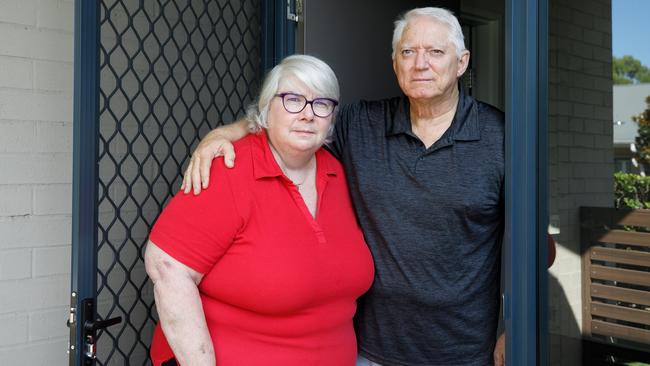New weight loss drug coming so Ozempic available to people with diabetes 2
The company behind the so-called ‘skinny pen’ Ozempic is set to bring the weight loss version of the drug to Australia – and it could be on pharmacy shelves within months.
NSW
Don't miss out on the headlines from NSW. Followed categories will be added to My News.
The company behind the so-called ‘skinny pen’ Ozempic is set to bring the weight loss version of the drug to Australia – and it could be on pharmacy shelves within months.
Wegovy contains the same active ingredient as Ozempic – semaglutide – but in different dosages.
The gamechanger is that while Ozempic is strictly off-limits to those keen to shed kilos, Wegovy has been approved by the Therapeutic Goods Administration for chronic weight management.
Demand for Ozempic skyrocketed mid last year with TikTok influencers spruiking their dramatic weight loss results due to the type 2 diabetes drug – and Danish drug maker Novo Nordisk was unable to meet supply.
However, stocks of Ozempic have started to replenish in the past week, and a company spokesman told the Sunday Telegraph it was also working hard to make Wegovy available for patients living with obesity “as soon as possible”.

“Obesity is a serious, chronic, relapsing condition with a high prevalence and a substantial
unmet medical need,” the spokesman said.
“We understand there is a significant need for medical treatment options for obesity.”
It’s not the only injectable drug about to hit our shores that has gained a social media following for its ability to help people lose weight.
Another diabetes drug, Tirzepatide, has also been shown to be highly effective for weight loss and there’s a push overseas for it to be approved for patients living with obesity too.
It‘s made by US company Eli Lilly, which also developed Trulicity for type 2 diabetes – another drug in short supply due to its popularity as an off-label treatment for weight loss.

Sydney doctor Georgia Rigas said many GPs welcomed this “third generation” of weight loss drugs; what was not welcome was the “weight stigma and shaming” the Ozempic shortage had prompted.
“The stigma is caused by a lack of understanding around the science of obesity,” she said.
“When people living with obesity lose weight through diet and exercise, hormonal changes occur and the metabolic rate decreases – it’s called metabolic adaptation – so most people will put the weight back on.
“So it’s not as simple as telling someone to eat less, or exercise more, as they’re literally fighting their biology.”
Dr Rigas said injectable medications worked to counterbalance that effect as they contained synthetic hormones like semaglutide or liraglutide which mimicked the effect of a naturally occurring hormone, GLP-1, which regulates appetite.
Due to their success, she said, there’d been a massive increase in the number of people actively seeking treatment for obesity.
“It’s important to note that every intervention – medication or surgical – has to be undertaken in addition to healthy lifestyle modifications,” she said.
“The goal is not just reducing kilos on a scale, it’s about the prevention of diabetes or other health risks, it’s about preventing knee pain or infertility, it’s about improving quality of life.
“So many people living with obesity say to me that they just want to take part in life, rather than live on the sidelines.”

Two in three Australians adults – or 12.5 million people – are overweight or obese according to an Australian Bureau of Statistics National Healthy Survey from 2017-18. It’s estimated more than 18 million Australians will be overweight or obese by 2030.
This time last year, the then Morrison Government launched Australia’s first National Obesity Strategy – to halt the rise and reverse the trend in obesity in adults and children.
Tiffany Petre is the director of the Obesity Collective, which was established to raise awareness of the causes of obesity, and get people to look at it differently.
“There’s no magic pill, no one thing that’s going to work for everybody,” she said.
“We’ve had medications before but they’ve had bad side effects, bariatric surgery is effective but quite extreme. The new generation of injectables provide people with another option that can help them achieve more weight loss than diet and exercise alone.
“It’s another option GPs can have in their tool kits to help people living with obesity, though with any treatment people still need to focus on good nutrition, being active and healthy.”
WE HAVE TO PAY FOR ‘LIFESAVER’
Ozempic has been a lifesaver for Sydney couple Yvonne and Christopher Holcroft – but only one of them is now deemed “worthy” of the medication which is in critical shortage globally.
Mr Holscroft can still pay just $7.60 per month to access the drug, which helps him manage his type 2 diabetes. However, access has been denied for his wife, who’s shed 35 kilos and seriously improved her health on the medication which she had to fork out almost $300 a month for.
With a raft of new weight loss injectables set to hit our shores, the couple has joined calls for more equitable – and subsidised access – and a stop to the “weight stigma” triggered by the Ozempic shortage.

“Do people with obesity not deserve access to better treatments, to healthcare?” Mrs Holcroft asked.
“I lost 35 kilos in five months on Ozempic – it’s not a magic fix, I worked hard at it. But where diet and exercise alone hasn’t helped me because of my other chronic health issues, Ozempic did work.
“It helped me control my diet and I didn’t crave food as much, and it eased a lot of symptoms from my other conditions – it’s greatly reduced my risk of getting type 2 diabetes and my specialists have told me the weight loss has added years to my life.
“So that’s why I’m frustrated that I’m unable to get it – when obesity is such a major health issue in our society, why aren’t people battling their weight being given choice, or equity, in healthcare?
“There’s plenty of other medications which are being used for conditions they weren’t first created for – why are people living with obesity vilified for wanting access to something that works?”
With her weight creeping up again, Mrs Holcroft is now hopeful of getting access to Ozempic as supplies start to return, or its weight loss version Wegovy.
“I was 136 kilos at my heaviest – I’m not trying to lose five kilos to post it on social media, I’m trying to reduce my risk of serious health issues.”
More Coverage
Originally published as New weight loss drug coming so Ozempic available to people with diabetes 2





